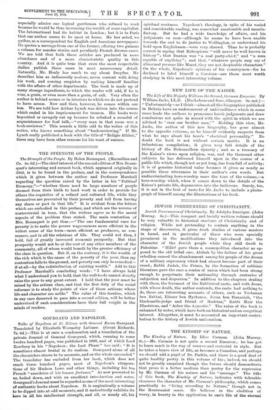The Strength of the People. By Helen Bosanquet. (Macmillan and
(Jo. 85. 6d.)—The chief interest of the second edition of Mrs. Bosan- quet-'s interesting and earnest book, which appeared originally in 1902, is to be found in the preface, and in the correspondence which it gives between the author and Professor Marshall regarding the question raised by the latter in his "Political Economy,"—" whether there need be large numbers of people doomed from their birth to hard work in order to provide for others the requisites of a refined and cultured life, while they themselves are prevented by their poverty and toil from having any share or part in that life." It is evident from the letters which are embodied in this preface, and which are the reverse of controversial in tone, that the writers agree as to the moral aspects of the problem thus stated. The main contention of Mrs. Bosanquet is put thus :—" The one fundamental cure for poverty is to make the poorer wage-earners more efficient in the widest sense of the term—more efficient as producers, as con- sumers, and in all the relations of life. They could not then, I hold, fail of greatly increased economic prosperity. But that prosperity would not be at the cost of any other members of the community, all of whom would benefit by the greater efficiency of the class in question. But if, on the contrary, it is the wealth of the rich which is the cause of the poverty of the poor, then my contention falls to the ground, and poverty can only be remedied— if at all—by the redistribution of existing wealth." Add to this Professor Marshall's concluding words : "I have always held what I understand you to hold, that the well-to-do cannot directly raise the poor to any great extent. I hold that the poor must be raised by the artisan class, and that the first duty of the social reformer is to study the points of view of those artisans whose life and character are noble." The value of this treatise, which in any case deserved to pass into a second edition, will be better understood if such considerations have their full weight in the minds of readers.


























































 Previous page
Previous page